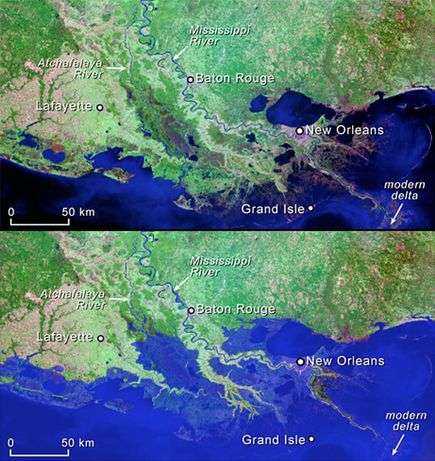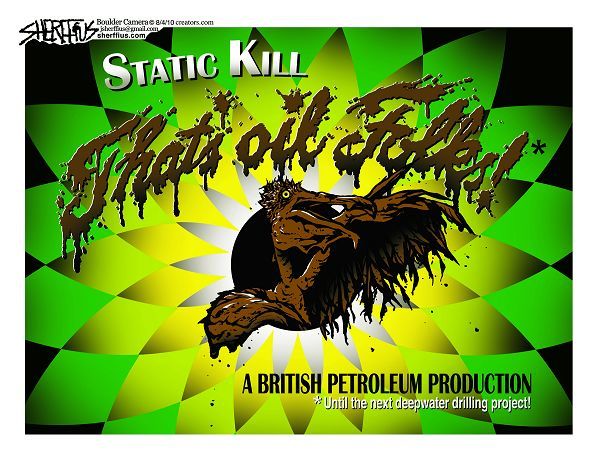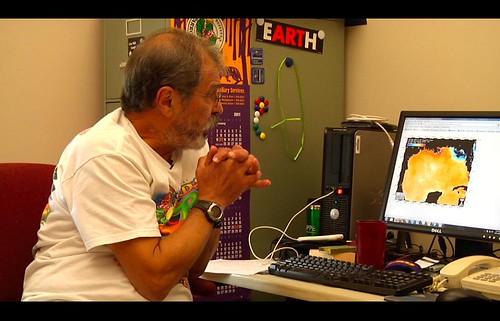by Meteor BladesBy Meteor Blades
From the beginning of the environmental movement, the biggest pushback has always been presented in terms of the economy. That's been true whether it's cod fishermen taking too big a catch in the Grand Banks, monocrop farmers sucking fossil water out of the Ogallala aquifer faster than it can be replenished, oil companies trashing indigenous land in Ecuador or loggers whacking massive segments of rain forest in the Amazon or Indonesia. When environmental advocates speak up about these matters, the first cry is invariably: what about the jobs? Not that jobs are unimportant. But too rarely is a case made for environmentally sound jobs and practices that can replace the ones causing the demolition of a particular eco-system, large or small.
The truth is that the environment and the economy are not two separate entities. They are inextricably intertwined with each other.
We're currently witness to another example of how climate change will have that intertwined effect. In Russia. Of course, what's happening there right now may only be weather, not a climate trend. We won't know for certain for a while yet. But the omens aren't good. And it's not just Moscow smog, a few dead people, ruined crops and some burned barns and homes. Here's what Isabel Gorst and Catherine Belton at the Financial Times had to say about it (subscription only):
Russia has begun counting the economic toll of the worst heatwave since records began as economists warned that the wildfires and disastrous summer harvest could wipe as much as 1 per cent off the country’s economic growth.
The record-breaking heatwave has destroyed grain crops across Russia, ruining close to a third of the country’s forecast harvest, while wildfires raging in the Moscow region have spread noxious smog over the capital, forcing businesses to close and many to flee the city.
Alexander Morozov, chief economist at HSBC, said the combined impact of the heatwave on agriculture and general economic activity could reduce Russia’s gross domestic product growth by about 1 per cent this year, a cost to the economy of about $15bn (€11bn, £9.5bn).
An estimated 10 to 13 per cent decline in Russian agricultural output this year would cost about 0.6 per cent of GDP, Mr Morozov said. Weather-related disruption to industrial production and the retail and services sector could account for a further 0.4 per cent decline.
Russia has been slowly climbing out of its worst recession since the late '90s, but Morozov says the impact of the drought and fires could stifle that recovery in the current quarter.
You don't have to live on a low-lying island or a coastal plain to be the target of bad effects from climate change. You don't have to be one of the millions who depend on drinking water from shrinking glaciers to be in the crosshairs. Anywhere. Everywhere.
= = =
At Daily Kos on this date in 2007:
There has to be an Orwell Corollary to Godwin's Law, one that says any discussion of today's Republican Party will invariably lead to comparisons with 1984. That's the easy place to run when trying to sum up the miasma of misdirection and jingoism that passes for Republican speech. But, damn it, when the candidates insist on treating the utterances of the Ministry of Truth as a textbook, what can you do?
Orwell
Freedom is Slavery
Giuliani
"Freedom is not a concept in which people can do anything they want, be anything they can be. Freedom is about authority. Freedom is about the willingness of every single human being to cede to lawful authority a great deal of discretion about what you do."
continued at Daily Kos...
 Above, modified satellite images show the river's delta plain as it appears today (top) compared with how much of the region might be submerged by 2100 due to a combination of trapped sediment and rising seas.
Above, modified satellite images show the river's delta plain as it appears today (top) compared with how much of the region might be submerged by 2100 due to a combination of trapped sediment and rising seas.

 We have had many battles over the years. We've fought for educational opportunities, recognition by the Federal government, protection of our homelands from coastal erosion and hurricanes, and we're now preparing for the impact of the massive oil spill. The BP Deepwater Disaster threatens the health and long-term survival of the United Houma Nation communities. Spread throughout six parishes of Southeastern Louisiana, our history, culture, and livelihoods are deeply tied to water. We are a resilient people and will do everything we can to preserve our way of life.
We have had many battles over the years. We've fought for educational opportunities, recognition by the Federal government, protection of our homelands from coastal erosion and hurricanes, and we're now preparing for the impact of the massive oil spill. The BP Deepwater Disaster threatens the health and long-term survival of the United Houma Nation communities. Spread throughout six parishes of Southeastern Louisiana, our history, culture, and livelihoods are deeply tied to water. We are a resilient people and will do everything we can to preserve our way of life.  Now that the hole in the ocean floor has allegedly been plugged and no more oil is gushing into the Gulf waters, the time has come to assess the damage and determine how to best allocate money and resources to minimize negative long term effects on the natural ecosystem, wildlife, and coastal residents and industries.
Now that the hole in the ocean floor has allegedly been plugged and no more oil is gushing into the Gulf waters, the time has come to assess the damage and determine how to best allocate money and resources to minimize negative long term effects on the natural ecosystem, wildlife, and coastal residents and industries.